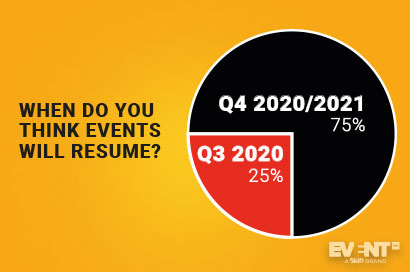Skift Take
As countries slowly reopen and, for some, allow large live events again, a majority of event planners foresee going back to business in the fourth quarter 2020 or early 2021. Is this a realistic approach?
Right now, two conflicting forces are in effect: the push to reopen economies worldwide and the fear of a resurgence of the virus. Live events are caught in between. They are at once very valuable to countries’ economies and they pose the greatest threat in terms of dissemination of the virus.
To make matters worse, event professionals have to negotiate the often murky waters of government regulations and health directives from the WHO and CDC. Nevertheless, some countries are reopening, and event planners are more than ready to go back to business.
In fact recent research by EventMB showed that, in a sample of 1,000 event professionals, “75% of event planners expect to go back to business in or after Q4 2020, and only 25% see Q3 as a viable option.” The most popular option was Q4 (28%) followed by Q1 of 2021 (27%). A further 20% were split up over the remaining quarters in 2021.
The third quarter is already upon us, and very few countries have allowed large events to reopen. Is the fourth quarter a more realistic option?
Where and When are Events Reopening?
Different countries (and even different US states) approach reopening events very differently, which makes it confusing for all event professionals eager to go back to work.
Many governments have elected to bundle professional events, such as exhibitions or conferences, with other mass gatherings, and that often means that they are part of the very last phase of many reopening strategies. For some, it even means waiting for a vaccine or a cure to be available.
Fortunately for the events industry, some countries have recognized the importance of such events to the global economy and are allowing them to restart, starting with Germany in May followed by Australia, some regions in Italy, Austria, and others.
Finally a bright light at the end of what seemed like a very long tunnel for the events industry! But many questions and uncertainties remain.
Should Event Planners Organize Large In-Person Events?
The biggest threat for events is a resurgence of the virus and a spike in infections, which could result in new lockdowns or bans.
Case in point, China reopened earlier than any other country but had to shut down again in some places due to new outbreaks of Covid-19. As a result, in Beijing, no exhibition or conference is allowed until further notice.
Many people fear that this could be happening in other places. As it is, in the USA, some states like Nevada have started reopening, causing a dramatic spike in coronavirus cases — with casinos being a major target of the criticism after crowds were pictured utterly failing to adhere to the social distancing and safety recommendations.
Does that mean that another complete shutdown is in the works?
We have to remember that economic pressure is what is primarily motivating premature reopenings. Any given government’s willingness to shut down a second time will depend on its economy’s ability to survive it.
But if large events resume and become the source of new clusters of infections, governments might be willing to ban these again until a vaccine or cure is found.
Aside from a possible ban from governments, several factors conspire against event planners on their quest to organize large events in Q3 and Q4.
Logistics
The logistics needed to organize a conference or an exhibition with thousands of attendees are, in the best of times, very complicated. These are not events that you can plan one or two months in advance. They require massive coordination of numerous resources, including venue, accommodation, caterers, AV, exhibitors, speakers, etc. — all of which you need to be able to anticipate reliably in advance.
Market Factors
While the likely scenario is that planners will have a hard time motivating attendees to come to events, any permission to host them is likely to produce a surge in demand as all those events that were postponed are added to the normal events for whatever seasn. Therefore, if things reopen in Q4, the condensed demand from a rush to get events back on the books as fast as possible might be too much for the supply, leading to a shortage in venues and other suppliers.
Profit and ROI
New safety procedures have to be implemented in the absence of a vaccine or a cure. Social distancing will make it difficult to have as many people as usual in indoor settings, costs may rise with cleaning and sanitizing recommendations, with the purchase of masks, thermal testing mechanisms, specific signage, etc. That means the question of whether live events will be profitable any time soon is still up in the air.
Travel Restrictions
Finally, there is major uncertainty about travel, especially international. Some countries have not reopened their borders yet, to reduce the risk of people bringing the virus back from affected areas. New Zealand, for example, has completely lifted the ban on mass gatherings but is still reluctant to open its borders. Others have implemented a 14-day quarantine period, which makes attending an event highly unpractical if you are not already in the country (or even the US state). Even those that have reopened their borders may close them if they produce detrimental effects on infection rates.
IN CONCLUSION
The third quarter seems like a difficult proposition for large events. If anything, it will probably be the time for small, local events.
The fourth quarter looks more likely but is still fraught with uncertainty. It’s likely, though, that formats will be different. For example, UFI just announced that they are changing the format for their Global Congress to be held in November. Instead of hosting one large event in Oman, they plan on running a number of local events around the world.
Ultimately, event planners will have to follow CDC and WHO recommendations as well as local regulations before they can start working again on live events. In the meantime, favoring virtual events is the safest way to go.





